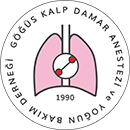

Effect of Previous Coronavirus Disease 2019 Infection on Patients Undergoing Open-Heart Surgery
Senem Girgin1, Murat Aksun1, İlknur Karagöz1, Birzat Emre Gölboyu1, Dilek Bayten1, Börteçin Eygi2, Hasan Iner2, Uğur Özgürbüz1, Ali Gürbüz21Department of Anesthesiology and Reanimation, İzmir Katip Çelebi University, Atatürk Training and Research Hospital, İzmir, Türkiye2Department of Cardiovascular Surgery, İzmir Katip Çelebi University, Atatürk Training and Research Hospital, İzmir, Türkiye
Objectives: This study aimed to evaluate the effects of previous coronavirus disease 2019 (COVID-19) infection on mortality, factors influencing mortality, and potential postoperative complications in on-pump cardiac surgery.
Methods: This single-center, retrospective, observational study included 233 adult patients who underwent on-pump cardiac surgery between June 2021 and February 2022. Patients with preoperative history of COVID-19 infection confirmed by nasopharyngeal swab polymerase chain reaction (PCR) test were compared to those without COVID-19 history.
Results: Patients mean age was 60.12±11.26 years (range, 2381 years), and 77.3% were male. The mean time from PCR positivity to surgery was 191.11±169.9 days (median, 108 days). No between-group differences were observed in anesthesia, cross-clamp time, pump time, operative time, extubation time, length of intensive care unit and hospital stay, or mortality (p>0.05). The post-COVID-19 group had higher rates of preoperative acute neurologic events and arrhythmias, pump lactate levels, and intraoperative inotropic scores (p<0.05). These factors were not associated with survival. Postoperative pneumothorax was more frequent in the post-COVID-19 group (p=0.002) and associated with longer length of hospital stay. No significant difference was observed in preoperative, postoperative, or changes in neutrophil/lymphocyte ratio (NLR) between groups.
Conclusion: Patients with and without COVID-19 history had similar outcomes after open-heart surgery. Nevertheless, the former had increased frequency of postoperative pneumothorax and prolonged length of hospital stay. Open-heart surgery seems safe after COVID-19. However, larger, prospective studies including inflammatory markers other than NLR are needed to further investigate the potential complications.
Manuscript Language: English
(318 downloaded)

















